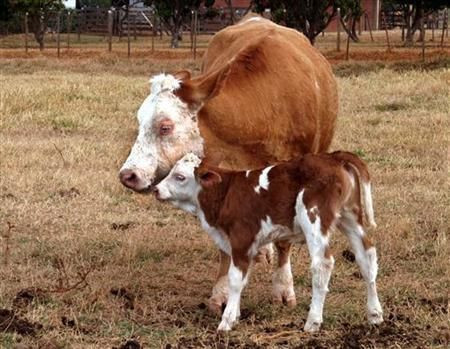Animal Farm Catch-22: EU Seeks To Ban Cloned Livestock, But Not Meat, Milk From Their Offspring

The European Commission, the executive arm of the European Union, said it will propose a ban on the cloning of farm animals and prohibit the sale of meat and milk from cloned animals, citing concerns about animal welfare and ethical questions surrounding the controversial subject of cloning. The proposals also call for a prohibition on the importation of any cloned food into the EU. The Commission further noted that the process of cloning is still far too expensive to make it economically viable for food production. The Commission also cited that most EU citizens also object to the practice of cloning creatures and eating products from such animals, surveys have shown.
Specifically, the proposed draft law wants “to ensure that no cloning for farming purposes will be carried out in the European Union and no such clone will be imported as long as these animal welfare concerns persist,” said the EU’s Health Commissioner Tonio Borg to reporters in Brussels. “It’s a ban on the technique, a ban on imports of the cloned animals themselves and a ban on food, milk or meat from the cloned animals.” The ban would apply to cows, pigs, sheep, goats and horse species, the Commission stated, adding that these measures are unlikely to have “a high trade impact.”
The European Voice noted that while cloned meat is not yet being used in the production of food in the EU, there exist no EU-wide restrictions governing their manufacture. In addition, health activists and religious figures worry about the possible future entry of such cloned meat into the food supply without proper supervision and monitoring. However, as the Voice also reported, the proposed set of rules do not require the meat and milk from the natural offspring of cloned animals to be labeled as such (something that Members of European Parliament had earlier demanded in 2011). At that time the EU’s member state governments complained that such labeling would be far too complicated and expensive, scuttling any deal. The governments in the EU also rejected that plea by citing that such a move might anger Europe’s trade partners.
One of the many problems related to cloned animals, the Commission noted, is that there is no system to properly track the offspring of clones, making it difficult to label their by-products. “This requires that parentage information for every food-producing animal is conveyed through the food-production chain,” the Commission said. “This becomes more complicated and therefore costly with every generation.” Moreover, under the Commission’s proposal, cloning would still be permitted for such purposes as scientific research, for the manufacture of drugs and medical products and for the conservation of rare and endangered species.
The Commission noted, however, that while no food businesses have applied for the right to sell meat and milk from cloned animals, a study by the European Food Safety Authority concluded that cloned food products do not differ in any way from normal livestock.
Some have criticized that the new draft proposals do not go far enough. “These measures are unfortunately a near duplicate of previous efforts which failed three years ago, which leaves us at a standstill,” said Monique Goyens, director-general of BEUC, a European consumer organization. “The Commission had plenty of time to come up with a more ambitious proposal. The lack of progress is disheartening.”
The proposed law remains subject to approval by the European Parliament and all EU governments. Thus far, Denmark is the sole member of the EU to specifically ban the commercial use of animal cloning. The European Parliament will likely debate the proposal early next year.
The EU has stated that the United States, Canada, Brazil, Australia, Argentina and Japan have confirmed that animals have been cloned in their countries, but to what scale is unknown. The Commission defines cloning as “creating animals by using the genetic material from a cell from another animal.”
Europe is a key producer of the world’s food – according to data from the United Nations’ Food & Agriculture Organization, the continent manufactured about one-fifth of the global pork production, 11 percent of its beef, and about 30 percent of global cheese exports, Bloomberg reported.
© Copyright IBTimes 2024. All rights reserved.




















